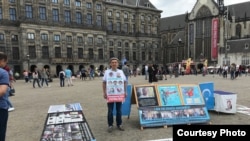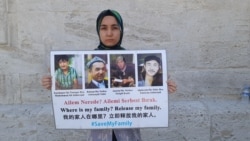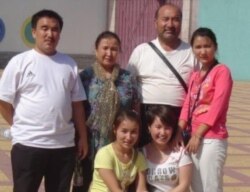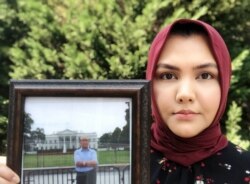Some members of the Uighur community abroad say China is now officially announcing the indictments or deaths of family members who vanished years ago in internment camps in the Xinjiang region.
VOA recently talked to five of those diaspora Uighurs who said they were either directly contacted by Chinese officials or learned through foreign missions, U.N. working groups, or Chinese government press conferences that their loved ones were either jailed on dubious charges or died of illnesses at the so-called reeducation camps.
Abdurehim Gheni, 44, a Uighur living in the Netherlands, told VOA he lost contact with his family in Xinjiang in 2017. He said a letter to the Dutch Foreign Ministry from the Chinese Embassy said that two of his brothers, a niece and two brothers-in-law had been sentenced to prison terms ranging from 3 to 16 years for crimes such as disturbing social order. The embassy said the rest of his family were "living normally in society," a claim Gheni, a naturalized Dutch citizen, said is far from reassuring.
He has held one-man weekend demonstrations in Amsterdam since 2018 to protest the sudden disappearance of his family.
He is not the only diaspora Uighur to receive news recently from the Chinese about missing family members.
The Chinese Embassy in Ankara told Nursiman Abdureshid, 32, that her parents and siblings had been imprisoned for "terrorism" after they disappeared in mid-2017. She believes the embassy contact was the result of the active advocacy she has led since February to secure the release of her family.
'Training'
Abdureshid left Xinjiang for Turkey in 2015 to pursue a master's degree and has not returned to the region. She said she learned from friends and distant relatives that her entire family had been taken to "training."
"After repeated tweets and public pleas, I finally got a phone call from the Chinese Embassy on July 15 telling me that my parents and two brothers were sentenced ranging from 13 to 16 years and 11 months in prison," she told VOA, adding that the embassy urged her go back to Xinjiang and ask local authorities for more details about the charges.
"For any Uighur, going back to China means interrogation, plus detention, upon arrival until proven innocent," Abdureshid said.
China rejects international accusations of the mass detention of over a million Muslim Uighurs in Xinjiang and claims the Uighurs are sent to "vocational training centers" to be "deradicalized" and to learn new work skills.
Fatima Abdulghafur, a Uighur from Sydney, told VOA that her 67-year-old father disappeared in 2016. She learned later that he had been taken to internment camps. The 40-year-old permanent resident of Australia learned last month from the U.N.'s Working Group on Enforced or Involuntary Disappearance that her father died of "severe pneumonia and tuberculosis" in 2018.
"I suspect the cause of my father's death was not simply from natural illness but from the unbearable torture in the camps," she told VOA.
Some rights groups say Uighurs being held in internment camps are exposed to torture and forced labor. Outside the camps, they are placed under strict control, where religious practices are prohibited.
International inquiries
China has repeatedly ignored calls from independent rights groups to investigate the alleged abuses, calling criticism by other countries an interference in its domestic affairs.
Sean Roberts, a professor of international affairs at George Washington University, said China's response to the U.N. inquiry is a signal that the country has become emboldened to use the international system selectively.
"I would not be surprised to see additional responses to international inquiries of this type while the state continues to deny that it is violating the human rights of Uighurs, especially as China takes an increasingly prominent role in the U.N. Human Rights Council," Roberts told VOA.
Last week, China was elected to the U.N. Human Rights Council a week after 39 countries, including the United States, condemned Beijing for human rights abuses in Xinjiang.
"We are gravely concerned about the existence of a large network of 'political re-education' camps, where credible reports indicate that over a million people have been arbitrarily detained," German Ambassador Christoph Heusgen said on behalf of the 39 countries at the U.N committee.
China's spokesperson, Hua Chunying, called the reports a failed attempt to smear China.
"A small number of external forces, out of ulterior motives, carry out interference in the name of human rights," Hua said.
China's contradicting accusations
Subi Mamat Yuksel, a 32-year-old Uighur American from Manassas, Virginia, believes her outspoken activism forced the Chinese government to announce the whereabouts of her missing father, Mamat Abdulla.
"I kept silent for almost three years, fearing that speaking up would endanger him," she said. Her father, 72, was arrested before his planned trip to the U.S. in 2017.
Yuksel learned in 2019 that her father, a retired director of the Xinjiang Forestry Department, was accused of being "two-faced" and "colluded with separatist forces." She said he was forced to write a letter from a detention camp asking her and her brother in the U.S. to return to China and apologize to the country.
Xinjiang government spokesperson Elijan Anayt denied the claim and said Abdulla was sentenced to life in prison for bribery.
"Her accusation was completely fabricated and aimed at misleading international opinion, to solicit support for her father and attack China's policies on Xinjiang," Anayt said in a news briefing in June.
An Uighur woman from Europe, who asked VOA to conceal her identity to protect her family in Xinjiang, said she was surprised this year when a Chinese official from the Uighur region told her via video chat that one of her parents had been sentenced to a prison term of over 10 years, after having vanished for more than two years.
"The official video-called me on WeChat and said that if I wanted my relatives to 'lead normal lives,' I'd better not publicize the imprisonment of my parent," she said.







